Contents
During the growing season, the leaves, and later the tubers of potatoes, often fall prey to insects. One of these is the potato moth, which causes the same damage to the culture as the Colorado potato beetle.
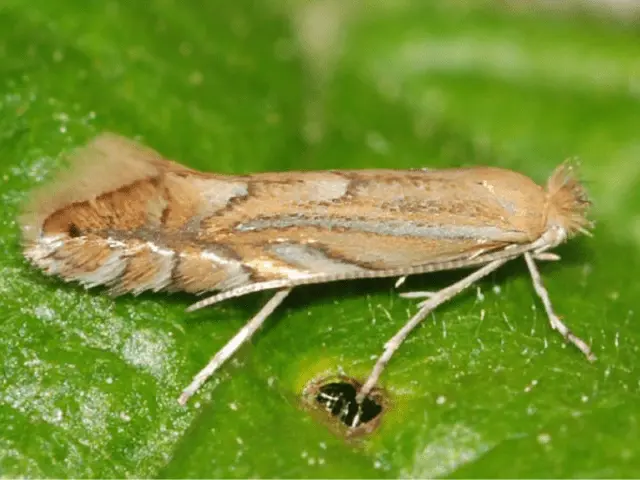
Potato moths are hard to spot on the leaves
What does potato moth look like
Potato moth (fluorimea) is a nondescript butterfly with a short, about 8 mm body, a tiny mouth that is unable to eat, and a long mustache. The upper and lower wings are painted in a bluish color, on the upper wings a pattern of circles and dashes of a darker shade is clearly visible.
The wingspan of the butterfly is 13-18 mm; at rest, the wings are folded along the body.
The potato moth larva is yellow-pink or gray-green in color with a longitudinal dark stripe on the back. On average, the length of one caterpillar is 10 mm.
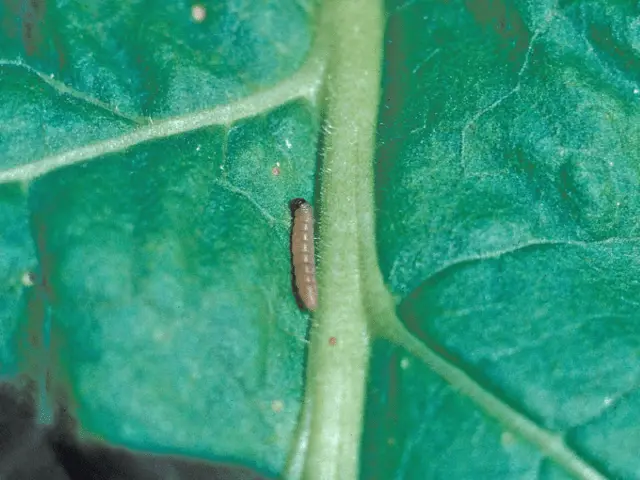
A small caterpillar can cause great harm
A small caterpillar can cause great harm
Development and reproduction
The life span of a butterfly is 3-14 days. However, in such a short period of time, she manages to lay about 100 eggs.
The ideal time for fluorimea is the end of spring and summer. In conditions of consistently warm weather, the full development cycle of potato moth from egg to butterfly lasts about 30 days. In cold summer conditions, this will take 70 days.
The potato moth is a moth. During the day, it can be seen only by looking under a potato bush, on the lower leaves of which it usually hides, or by running a hand over the tops – a disturbed insect will leave its shelter and fly out of the bush.
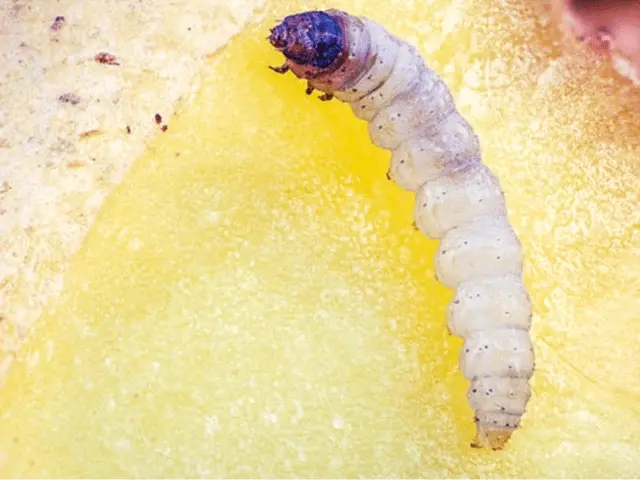
A small caterpillar can cause great harm
Signs of defeat
The color of the wings allows the butterfly to remain invisible on the leaves of cultivated plants, which makes it difficult to determine the beginning of summer.
However, the following signs indicate the presence of this pest:
- the appearance of gray spots on the surface of the leaf plates (dry rot);
- visible traces of moves (thin white strokes);
- microscopic, barely visible to the naked eye pits on the leaves, filled with waste products of the potato moth;
- drying of apical shoots;
- the appearance of cobwebs on the bushes;
- the presence of passages on the surface of tubers and the presence of small worms in them.
To diagnose the defeat of bushes with potato moths, first of all, carefully examine the central vein on the outside of the leaf plate. If there are cobwebs and small white grains, which are nothing but the excrement of larvae, then the moth has already begun its harmful activity.

The potato moth larva leaves characteristic traces on the tubers
What harm does
Potato moth does not cause particular harm to plants, which cannot be said about its larva. Almost immediately after birth, a small white caterpillar begins to make moves in the leaves and stems of potatoes, feeding on their succulent tissues.
As a result of such activity, the growth and development of the ground parts of the plant slows down, damaged leaves and stems wither and dry out.
In addition, the seeds of the affected potato cannot be used in the propagation process of this crop.
The potato moth does not bypass the potato tubers located near the surface of the soil – the larvae bite into the juicy pulp, laying numerous narrow passages in it. Tubers affected by potato moths lose their presentation and become unsuitable for human consumption.
This pest is not afraid of temperature changes. Its larvae feel great in hot weather and when the thermometer drops below zero degrees.
Therefore, if the potato moth enters the storage along with the potatoes during the harvesting process, it will continue its pest activity, laying eggs directly on the surface of the tubers, and before the onset of spring it can spoil the lion’s share of the crop.
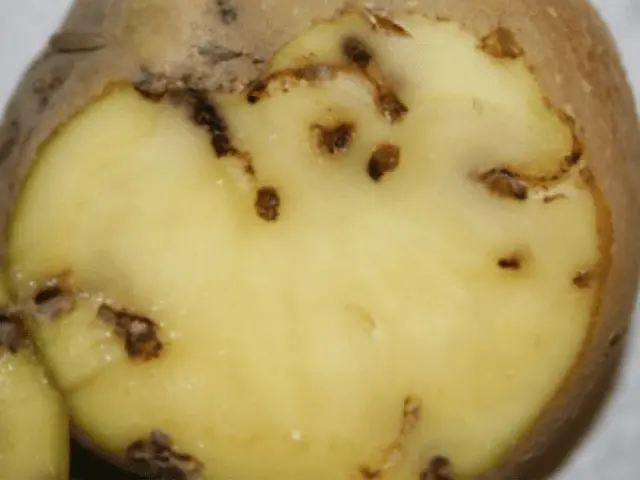
There can be several caterpillars in one potato at once.
There can be several caterpillars in one potato at once.
Measures to combat potato moth
Ignoring the appearance of fluorimea on the beds with potatoes can cause the loss of part of the crop. To prevent this from happening, you need to fight the potato moth in the garden at the first sign of its appearance.
Biological method
The biological method for the destruction of moths is the spraying of bushes with drugs that have a detrimental effect on pests and do not pose a danger to plants and humans.
Such agents are less effective than insecticidal preparations. However, unlike the latter, which are characterized by a long waiting period, biological products can be used a few days before harvest, which allows you to control pests during the fruiting period.
All biological agents are used to process not only potato bushes, but also tubers. In the latter case, the infected root crops are dipped for ten minutes in the working solution prepared according to the instructions, after which they are removed and dried well.
There are a huge number of biological products to combat potato moths. The only disadvantage of using them is that the processing will have to be done more than once. To forget about potato moth forever, it is recommended to spray the bushes every ten days.
Bithoxybacillin
A contact-intestinal drug that enters the body of the potato moth through the oral cavity along with food and through thin chitinous covers. Pests disappear five days after treatment.
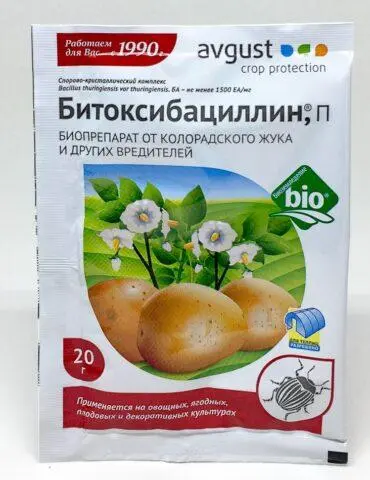
Bitoxibacillin will help to destroy not only the potato moth, but also other pests
Phytofarm
An effective tool used to combat a number of pests, including potato moth. Insects will die a couple of days after treatment.
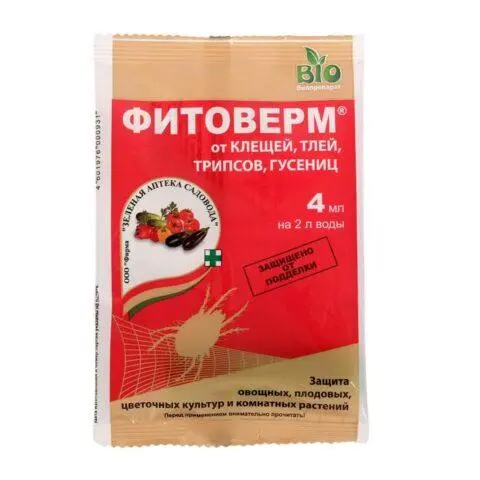
Potatoes can be eaten as early as three days after processing
Lepidocid
It has a characteristic aroma that the potato moth butterfly does not really like. Penetrating into the intestines of the pest, the active substance of the drug destroys its walls and paralyzes the activity of the digestive organs.
Lepidocide destroys potato moth at all stages of its development. As a rule, insects die within two days from the moment of processing.
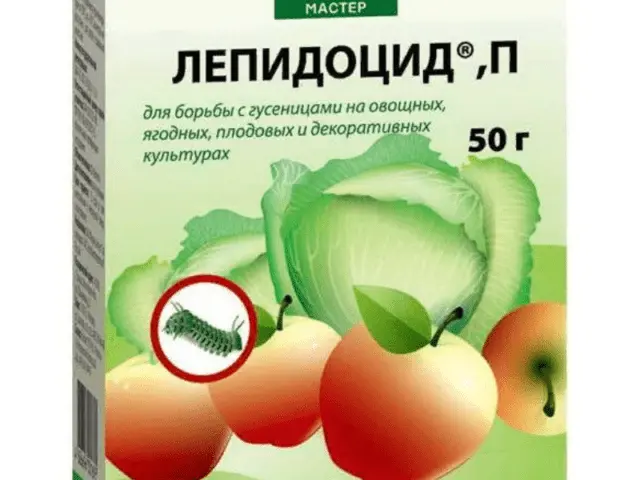
The drug is used in the dosage indicated in the instructions.
Agrotechnical method
Agrotechnical ways to combat potato moths are a set of measures that prevent pests from accessing tubers.
To protect tubers from damage by larvae will help:
- regular hilling of bushes, preventing the appearance of tubers above the soil surface;
- timely removal of weeds from the garden;
- annual digging or plowing of the soil to a depth of at least 25 cm.
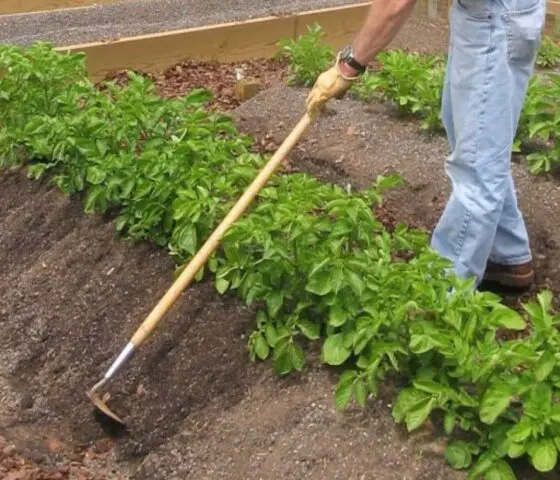
A layer of soil will protect the potatoes from damage
Chemical preparations for potato moth
The most effective way to deal with potato moths is to treat the culture with chemicals. You need to spray the plants immediately after the appearance of the butterfly, without waiting for the caterpillars.
You can detect the presence of a pest in potato beds by carefully examining the leaves or by installing special pheromone traps with moth sex hormones.
To combat the pest, pyrethroids or organophosphorus compounds are used. Both those and others, entering the body of the larvae along with the juice of the leaves, provoke paralysis, as a result of which the insect dies.
The list of pyrethroid insecticides includes drugs Decis, Inta-Vir, Ambush, and organophosphorus – Zolon, Volaton, Foxim.
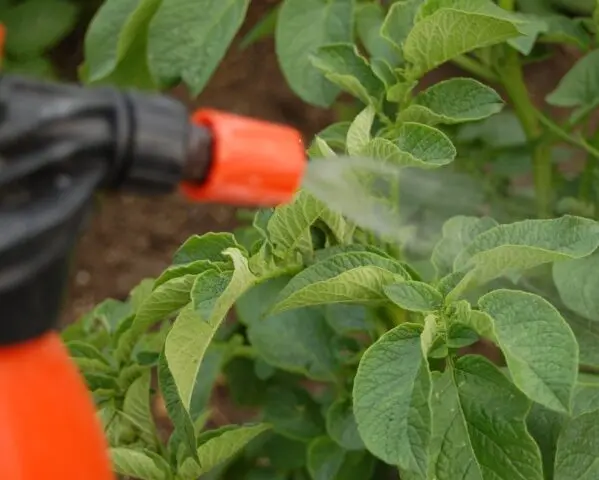
Spray potatoes with insecticides no later than 30 days before harvesting
Folk remedies for potato moth
Some gardeners prefer to deal with potato moths with the help of so-called folk remedies.
To help control pests:
- Wood ash, which is added to the holes when planting potatoes.
- Means of ash and wormwood, for the preparation of which 1 tbsp. ash is combined with 1 tbsp. chopped wormwood and pour all 3 liters of boiling water and leave to infuse for two hours. The resulting product is filtered and sprayed with bushes or tubers.
- Onion and wormwood infusion – 200 g of dry chopped wormwood, 50 g of onion peel and 100 g of liquid soap are mixed and poured into 5 liters of boiling water. After the solution is well infused (5-6 hours), it is filtered and used for spraying plants.
With such means, it is necessary to process plantings at least 3 three times per season.

Folk remedies are absolutely harmless to potato bushes
How to protect potato crops from moths
To get a good harvest of high-quality potatoes, care should be taken to prevent damage by pests, including fluorimea.
To reduce the likelihood of potato moths will help:
- cultivation of early varieties of culture, the period of formation of tubers in which ends before the beginning of the summer of potato moth;
- thorough inspection of potatoes before planting with the removal of all damaged and suspicious specimens;
- heating tubers before planting for two hours at a temperature of 40 ° C;
- planting potatoes to a depth of at least 20 cm, followed by regular hilling of bushes;
- installation of pheromone traps (1×10 sq. m);
- regular sprinkling, which will help destroy some of the butterflies;
- preventive spraying with insecticides at the time of budding and flowering;
- regular inspection of plantings for the presence of pests and the timely destruction of the latter.
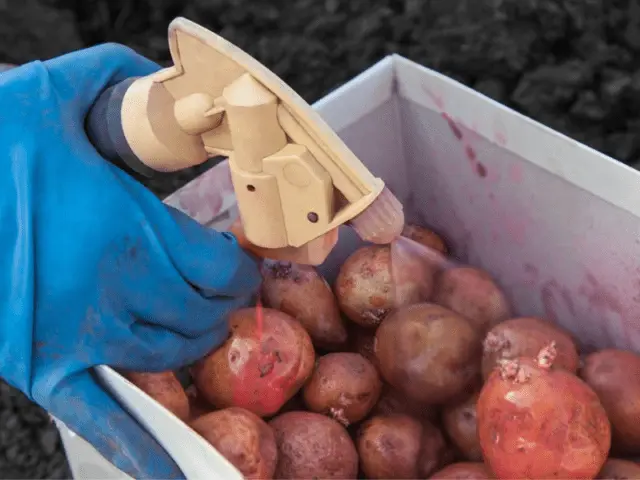
You can use a small spray bottle to spray potatoes.
Conclusion
Potato moth is a small but very dangerous pest that can destroy a large part of the crop in a short time. To prevent such troubles, the timely detection of fluorimea and the immediate destruction of insects will help.









